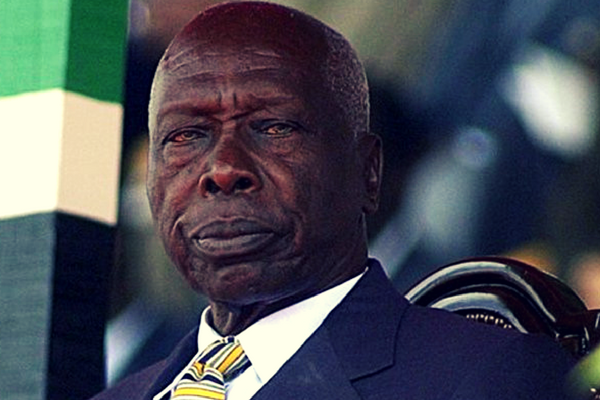Domestic Policy
President Daniel Arap Moi was elected unopposed in 1979 with Mwai Kibaki as his Vice President and Minister of Finance. Domestically, Moi was quickly confronted with domestic problems such as food shortages, and a severe drought. His administration also faced allegations of corruption. However, to solidify their power, Parliament passed a law making it a one party state. Opposition activists like Odinga and academics and politicians that had opposing views were jailed without trial.
In response to the new law and tactics employed by Moi’s administration, members of the Air Force attempted a coup on August 1, 1982. The Air Force and university students seized control of the government controlled broadcaster, Voice of Kenya, the Nairobi airport and the main post office. The coup was quickly crushed by the army, but not before 150 people lost their lives and extensive damage occurred caused by looting.
In order to validate his power, President Moi called for new elections in which both he and Kibaki retained their power. This gave Moi more resolve to consolidate power. He expanded the powers of the Presidency; in addition, he removed the tenure of the attorney general, high court judges, the controller, auditor-general and public service commissioner so that he could dismiss those who would not adhere to his will. Moi also introduced the open ballot.
President Moi faced a lot of criticism for his heavy handed approach to governing. Several members of the MwaKenya movement were imprisoned without trial and accused of trying to overthrow the government. After the 1988 election, Kibaki was dropped as Vice President but became remained in cabinet.
After facing both internal and external pressure, Moi agreed to some reforms such as reintroducing tenure for important posts and secret ballots during elections and allowing other parties to contest elections. Many new parties were formed such as the Forum for the Restoration of Democracy (FORD) and the Democratic Party (DP) led by Kibaki after he resigned from KANU in 1991. Due to the fractured nature of the opposition, Moi was able to win the December 1992, Presidential election with only 36% of the vote.
Foreign Policy
After Independence, Kenya maintained strong ties with Britain from whom they received some foreign aid and military assistance. Throughout the 1960s and 1970s, Kenya was mostly silent on African affairs as well. Kenya did not have a good relationship with Somalia and after 1975; the relationship with Uganda now under Amin was not a great one either. Under Daniel Arap Moi, however, they became more active in the world and Africa more particularly.
In 1991, Moi was chosen as chairman of the Organization of African Unity. Kenya looked more to the United States than Britain for foreign aid and military assistance. They even joined the US in the 1980 boycott of the Olympic Games held in Moscow. Moi also gave the United States military facilities in the country.





4 responses to “The Moi Presidency in Kenya (1979-1992)”
Very informative.
After all that corruption & power grab what is his legacy?
Trump is now in power. First order of business cutting mortgage aid programs. Second cutting healthcare & guess who is being targeted. The presidency of Trump is going to reveal real America.
Ignoramus clergy for Trump after he is done gentrifying the inner cities there will be nothing like a mega black church & no more parishoners to fleece. Enjoy the bentleys whike you still can.